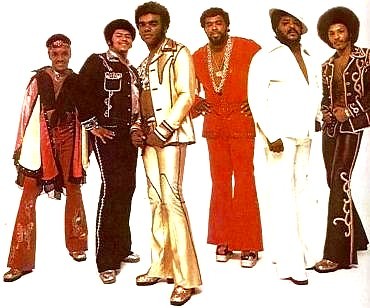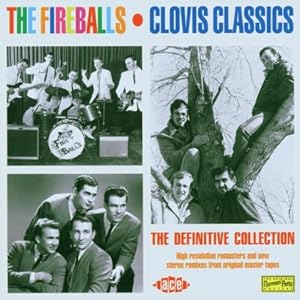
The Isley Brothers were another group with a number of personalities and, in their case, more record labels than you can shake a stick at. Their first hit was on RCA, odd given that the major labels weren’t exactly heavy into R&B in the 50s. They switched over to Scepter (Wand really, but same difference) where they did Twist And Shout, and then to United Artists, where they had no hits, then to Motown (Tamla really, but same difference) where they had a handful of minor hits, plus This Old Heart Of Mine, and where they tried very hard to fit the Motown mold, and it wasn’t all that great a fit. Beginning in 1969 they recorded for their own T-Neck label, distributed first by Buddah, then by Epic, and they became a kind of psychedelic funk group, singing about free love and fighting the power.
Putting this collection together wasn’t simple…
The Isley Brothers:
•
Shout – Exuberance personified as R&B. This was actually two songs, Shout Part One, and Shout Part Two, and as Dave Marsh says, “Part One has the lyrics, but its ending is as truly anticlimactic as anything is Western art.” He puts Part Two into his
Heart Of Rock And Soul, but it was Part One that was hit, anticlimactic ending and all. What is mystifiying about it is why it didn’t reach higher than number 47, especially given its iconic status . Their only hit on RCA, from late 1959. It was much bigger hit later for Joey Dee & The Starlighters, at which time RCA reissued the Brothers’ single, watching it reach the great heights of number 94. The song was also Lulu’s first hit (Lulu & The Luvvers) in 1964.
•
Twist And Shout – More shouting. The song was far more famous by The Beatles, (Dave Marsh again: The Brothers’ version “seem absolutely lame.” Sorry Dave, don’t agree.) The Isleys’ version is a lot more soulful, and works in its own way. From the summer of 1962.
•
Time After Time – I didn’t write this song down on the label, so I’m guessing the title. A ballad.
•
Twistin’ With Linda – I used to know a girl named Linda, but I didn’t twist with her. From the fall of 1962.
•
Take Me In Your Arms – The Isley Brothers on Motown. This was a cover of a song that was a hit my Kim Weston. Covered later by Charity Brown and by The Doobie Brothers. A let’s-have-one-last-hug song. Not gonna happen, pal.
•
Put Yourself In My Place – A musically awkward song about empathy.
•
This Old Heart Of Mine (Is Weak For You) – The Isleys’ shining moment on Motown. The only top 40 hit they had on the label (it reached number 12 in the spring of 1966) it cuts a deep groove. Rod Stewart didn’t come close.
•
I Guess I’ll Always Love You – A good example of how the structured Motown approach didn’t work for the Isley Brothers. From the summer of 1966.
•
Behind A Painted Smile – Another Motown record, this one about emotional disingenuousness.
•
Love The One You’re With – Stephen Stills’ theme of amorality funkified. From the summer of 1971. I prefer Stills.
•
Lay Away – Love on the deferred payment plan. From the spring of 1972.
•
Freedom – Freedom in pop music is always so simple: you can do what you want to do, when you want to do it, however you want to do it. It’s never tempered with responsibility. This is not the Jimi Hendrix song. From the winter of 1971.
•
It’s Your Thing – This, more than any song, is the one that put The Isleys on the map. Their ode to free love and damn the consequences, a year before Stephen Stills’ Love The One Your With, works on the basis of its funkiness more than the lyrics. It’s the one Isley Brothers song I remember hearing on the radio. From the spring of 1969.
•
Get Into Something – And we know exactly what that “something” is. From the fall of 1970.
•
Work To Do – Most of the rock / pop / R & B songs about work are of the complaining type. This one complains too, but the other way. Leave me alone, our singer intones, I have work to do. From the winter of ’72 / 73.
•
Keep On Doin’
•
Spill The Wine – A cover the hit by Eric Burdon & War, and I don’t know why they bothered. Nobody could touch Burdon on this. From the fall of 1971.
•
Pop That Thang – Bang bang bang. From the fall of 1972.
•
Brother, Brother – An odd song, this one, it’s like he’s singing to an actual flesh and blood brother.
•
I Turned You On – “Now I can’t turn you off,” he seems to be complaining, but it’s not a complaint after all. This is the Isleys’ idea of a love song. From the summer of 1969, the summer of Woodstock. The follow-up to It’s Your Thing.
•
Vacuum Cleaner – My love is like a vacuum cleaner, sings our hero. Perhaps he means that it sucks. I’ll leave it there.
•
I Know Who You’ve Been Socking It To – Picks up where It’s Your Thing and Pop That Thang leave off. It’s just that I’m not quite sure where that is…
•
What’s That Lady – The original recording of this (later called That Lady), on United Artists. It was from about 1964.
•
That Lady (Part 1 & 2 ) – Listening to the two versions of the song is extraordinary. Doesn’t sound like the same group. Part 1 of this psychedelicized paean to a mystery lady was a hit in the fall of 1973.
•
Live It Up (Part 1 & 2) – Can’t argue with the sentiment. Part 1 was a hit in the fall of 1974.
•
Hope You Feel Better Love
•
Fight The Power – The revolution was wearing thin by the fall of 1975, when this was a hit.
•
For The Love Of You – The Isleys weren’t that great at love songs. From the winter of 75 / 76.
•
Hello It’s Me – A weird take on the Todd Rundgren hit.
•
(At Your Best) You Are Love – “You are a positive motivating force within my life,” sing the boys, in what is probably the most unpoetic love lyric ever written.
•
Summer Breeze – A weird take on the Seals & Crofts hit. From the spring of 1974.
 I was going to write that this is an obscure album by an obscure group, but googling it and finding several references has convinced me otherwise. Apparently Bill Black’s Combo still lives (though I bet you’ve never heard of them) and so does the early 60s best of collection, called Bill Black’s Greatest Hits.
I was going to write that this is an obscure album by an obscure group, but googling it and finding several references has convinced me otherwise. Apparently Bill Black’s Combo still lives (though I bet you’ve never heard of them) and so does the early 60s best of collection, called Bill Black’s Greatest Hits. Before we get hard core into the 60s, we take a brief break for some old time big band jazz, all recorded in the late 50s. It's a CD called Compact Jazz.
Before we get hard core into the 60s, we take a brief break for some old time big band jazz, all recorded in the late 50s. It's a CD called Compact Jazz. The Isley Brothers were another group with a number of personalities and, in their case, more record labels than you can shake a stick at. Their first hit was on RCA, odd given that the major labels weren’t exactly heavy into R&B in the 50s. They switched over to Scepter (Wand really, but same difference) where they did Twist And Shout, and then to United Artists, where they had no hits, then to Motown (Tamla really, but same difference) where they had a handful of minor hits, plus This Old Heart Of Mine, and where they tried very hard to fit the Motown mold, and it wasn’t all that great a fit. Beginning in 1969 they recorded for their own T-Neck label, distributed first by Buddah, then by Epic, and they became a kind of psychedelic funk group, singing about free love and fighting the power.
The Isley Brothers were another group with a number of personalities and, in their case, more record labels than you can shake a stick at. Their first hit was on RCA, odd given that the major labels weren’t exactly heavy into R&B in the 50s. They switched over to Scepter (Wand really, but same difference) where they did Twist And Shout, and then to United Artists, where they had no hits, then to Motown (Tamla really, but same difference) where they had a handful of minor hits, plus This Old Heart Of Mine, and where they tried very hard to fit the Motown mold, and it wasn’t all that great a fit. Beginning in 1969 they recorded for their own T-Neck label, distributed first by Buddah, then by Epic, and they became a kind of psychedelic funk group, singing about free love and fighting the power.
 I don’t think Dixieland ever made the Hot 100. I could be wrong, and if I am, then let me know. But either way, it wasn’t something you were likely to hear on top 40 radio.
I don’t think Dixieland ever made the Hot 100. I could be wrong, and if I am, then let me know. But either way, it wasn’t something you were likely to hear on top 40 radio. Johnny Preston was another artist honoured to be there at the cusp of the new decade. Altogether he had 5 records on the Hot 100, ending in 1961.
Johnny Preston was another artist honoured to be there at the cusp of the new decade. Altogether he had 5 records on the Hot 100, ending in 1961. The 60s. There’s so much been said and written and discussed about the 60s, the magical 60s. And we forget that it’s just arbitrary numbers on the calendar.
The 60s. There’s so much been said and written and discussed about the 60s, the magical 60s. And we forget that it’s just arbitrary numbers on the calendar.
